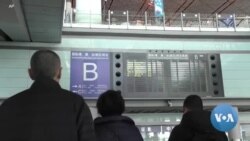The White House explains why COVID tests are now required for travelers from China.
Welcome to VOA Asia Weekly. I'm Chris Casquejo in Washington. That story is just ahead, but first, making headlines.
Japanese Prime Minister Fumio Kishida and British Prime Minister Rishi Sunak signed a defense agreement in London on Wednesday that will allow the countries to deploy forces on each other's soil, the latest move towards closer security ties. The Reciprocal Access Agreement is Japan’s first with a European nation.
U.S. Secretary of State Antony Blinken and Defense Secretary Lloyd Austin met on Wednesday with their Japanese counterparts and issued a joint statement that will adjust, but not increase, the American troop presence on the island of Okinawa.
Malaysia's Prime Minister Anwar Ibrahim was in Indonesia Monday on his first overseas trip since taking office. He said Malaysia intends to contribute to the development of Indonesia’s new capital city on their shared Borneo island. Ibrahim and Indonesian President Joko Widodo oversaw the signing of economic agreements estimated to be worth $263 million.
Nepal’s newly appointed prime minister secured a decisive vote of confidence in parliament on Tuesday with support from both his seven-party coalition and the opposition. Nepal has had 11 governments since 2008, when its 239-year-old monarchy was abolished.
Thailand has withdrawn its decision to request COVID-19 vaccine proof from visitors — only days after announcing new rules for all international arrivals. Thai government officials welcomed Chinese tourists who flew into Thailand from China at Bangkok's airport Monday. Thailand's economy relies heavily on tourists, especially from China.
China suspended issuing certain types of visas to travelers from Japan and South Korea after the two countries required COVID tests for travelers from China amid spiking infections in that country. On Wednesday, China imposed further restrictions by removing the visa exemption for transit travelers from the two Asian neighbors. A Japanese cabinet secretary called that decision "highly regrettable.”
Japan and South Korea are two of about a dozen countries that have followed the United States in requiring negative tests for travelers coming from China, which has drastically lifted most of its “zero-COVID” restrictions for the first time in three years but also has been experiencing a major outbreak since last month.
A member of the White House COVID response team explained that the requirement was put in place because China is not sharing as much genomic surveillance data as other countries or information about patients requiring hospitalization in intensive care units.
“The reason these things are necessary is that if there was a variant of concern, lack of access to this data delays identification of those variants, and then it leaves our public health officials less prepared to respond to new variants that may arise that could increase the severity of disease and could impact our diagnostics or vaccines or treatments. And so it's not so much about the individual passenger, it's ensuring that we have a better understanding of the epidemiological situation.”
The U.S. began requiring COVID tests from travelers from China on January 5th.
Visit voanews.com for the most up-to-date stories. You’re watching VOA Asia Weekly.
China and Ecuador recently announced a new free trade agreement.
The pact is expected to boost Ecuadorian exports of agricultural products like shrimp, bananas, cocoa and coffee.
The two countries already do about 10 billion dollars' worth of trade annually.
An economic analyst explained why the U.S. might be concerned about the agreement.
“The U.S. red line is more about China providing credit and financing to Ecuador. The U.S. worry isn’t trade, but concern that countries in Latin and South America might end up in debt to the Chinese."
For China, the agreement isn’t just about access to Ecuadorian agricultural goods.
The South American country also has large reserves of copper, iron ore and oil.
A major Japanese retailer announced a big wage increase for workers Wednesday.
Uniqlo parent company Fast Retailing said it would raise wages by as much as 40 percent, in the clearest sign yet that Japan's rock-bottom salaries may be starting to budge after decades of deflation and cost-cutting.
Prime Minister Fumio Kishida has repeatedly called for companies to increase wages in the face of high inflation.
Finally, thousands of Catholic devotees in Manila attended masses on Monday to mark the annual feast of the “Black Nazarene,” even as Philippine authorities canceled its traditional parade for the third year in a row due to COVID concerns.
In pre-COVID years, millions of devotees clad in yellow and maroon would throng the life-sized “Black Nazarene” statue as it was paraded through Manila on a rope-pulled carriage.
Thanks for watching VOA Asia Weekly. I’m Chris Casquejo. Until next week.











